MENUMENU
- Home
- The Horse
- Membership
- Registration
- Competition
- Rec Rider
- Events
- Marketplace
2022 marked the Paso Fino Horse Association’s 50th Anniversary. The year culminated in a huge celebration at the Grand National Show held at the World Equestrian Center in Ocala Florida where members were taken on a journey to honor the men, the women and the horses of this incredible breed.
The roots of PFHA began over 50 years ago, when thirty some Paso Fino aficionados got together to “officially” formulate their passion into a business to register pureblood Paso Fino horses. From this meeting in 1972 the Paso Fino Owner and Breeders group was formed. Notably member number #1 was issued to the late Rosalie MacWilliams and member #2 was the late George LaHood. These two along with the other organizers laid the groundwork for what has become the Paso Fino Horse Association. In the United States, the Paso Fino Horse Association is the purest registry of Paso Fino horses and hosts the premier competition for its members to attain National Championship titles.
These founding members gave the distinguished title of “Foundation Sires” to 6 worthy stallions.
These stallions helped to establish the foundation of today’s Paso Fino horses and secure a future for the Paso Fino horse here in the United States of America.
Tonight, as we recognize the contribution of our founders. We have the distinct honor to have four of them with us in this arena:
At the 50th Anniversary ceremony four members were honored for their contributions, their foresight, and their continued passion!
These four individuals have held numerous positions within our Association, helping it thrive and become respected worldwide. As an Association, PFHA has become the leader due to the high standards that have been set and maintained.
As this newly founded Association developed into a business reality – the leadership was also formed. The Presidents were the volunteers that stepped up and took the reins leading our Association down the path to where we are today. The following is a list of PFHA Presidents who helped forge the way.
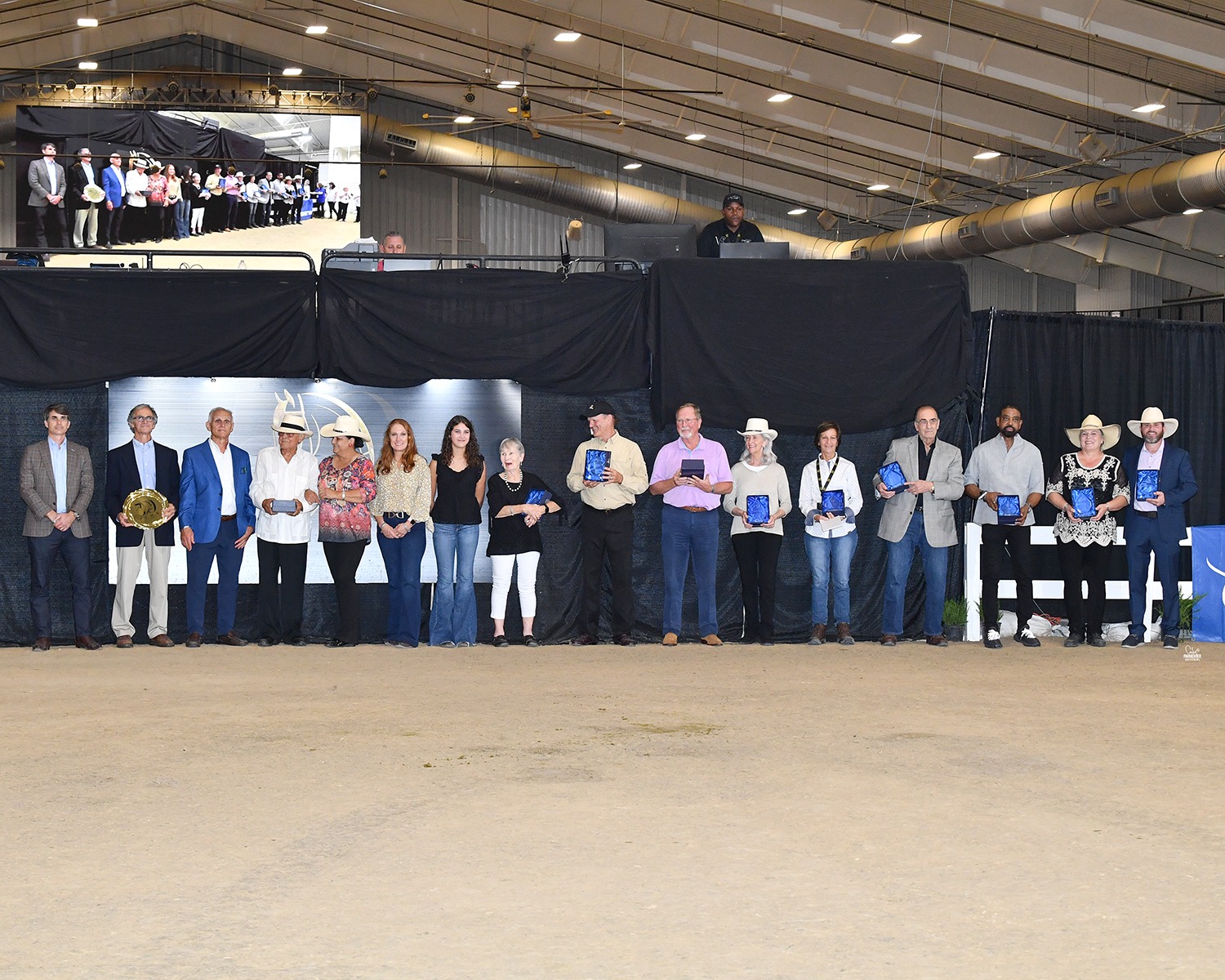
These dedicated individuals rose to the challenges of their times – through growth, hurricanes, pandemics, and whatever hardships came their way THEY persevered and “We are PFHA!”
In 1998, under the Presidency of Mr. Larry Johnson, the Paso Fino Horse Association established a “Hall of Fame” to recognize members and horses. In 1999 the first inductees were nominated. That first year four members and four horses were inducted, followed by three in 2000 and two in 2001. Starting in 2002, the Association began the process as we know it today choosing one member and one horse from the nominations.
The Hall of Fame Inductees for Horses are:
Members who have contributed greatly to the PFHA are honored with their induction into the Members Hall of Fame. They include
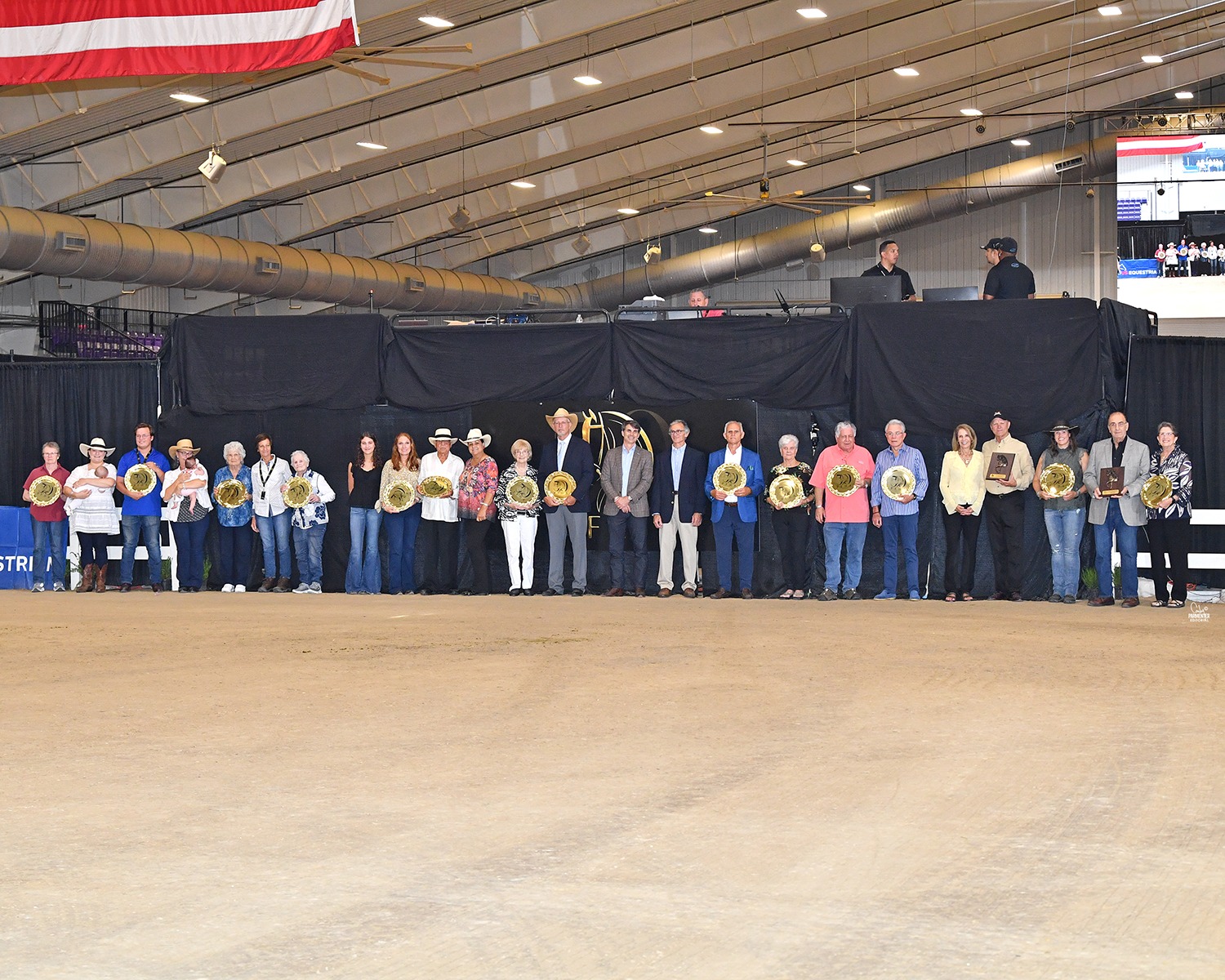
As an Association we grew to host the most prestigious shows with some of the most dedicated, knowledgeable, and respected officials in the industry. In 2019 the Board of Directors wanted to acknowledge those that had dedicated themselves as officials representing the PFHA by granting those worthy of Emeritus Status. Our past honorees include:
Our 2022 honoree, Dr. Rolando Colón Nebot is a breeder, exhibitor and retired international judge of Paso horses. He was certified as a Senior Certified Judge by the Paso Fino Horse Association (PFHA); a “R” with the United States Equestrian Federation (USEF) of the United States, as well as being certified by FEDEQUINAS from Colombia and the International Paso Horse Confederation (CONFEPASO).
Dr Colón Nebot is a LIFE member of the Paso Fino Horse Association and an Active member of the Puerto Rican Association of Paso Fino Horse Breeders of America (Los Abiertos).
One of founder members and first president of the Puerto Rican Association of Paso Horse Judges.
Dr Colón Nebot used his expertise to form the organization CONFEPASO in 1991. He then served as vice president. He assisted in editing the first by laws and regulations of CONFEPASO. In recognition of his extraordinary work, he was bestowed an honorary life membership.
In addition to being an official of PFHA, he served as member of the Judges and Stewards and Education committees. He wrote several articles with an emphasis to the controversial issues referencing the paso fino and trocha horses and their gaits.
Dr Colón Nebot is the author of the several books: “El Caballo de Paso, Estudio Ilustrado de sus Aires” y “El Caballo de Trocha desde el Arco a la Trocha de Nuestros Días”
As a judge, he has officiated in many different countries such as the Dominican Republic, Curacao, Aruba, Venezuela, Colombia, the United States and Puerto Rico. He has also judged the World Championships of Paso Horses (The Mundial) in the years 1986, 1993, 1997, 2001, 2005 and 2007 and serve as a judge for the PFHA National Show during the years 1997, 1999 and 2004.
Dr. Rolando Colon Nebot is an orthopaedic surgeon in Puerto Rico where he is the Chief Orthopaedic Surgeon and Medical Director of the Hospital Pavia de Arecibo.
Congratulations to our 2022 Emeritus Status Winner!
For an association to reach the height of success that PFHA enjoys today requires tremendous sacrifice and endless volunteer hours. We would like to salute those individuals for their time, dedication, and continued support. There are numerous members deserving of such an award.
PFHA honors those members who were and remain one of the first 1,500 to join the association
the DECADES OF DISTINCTION award:
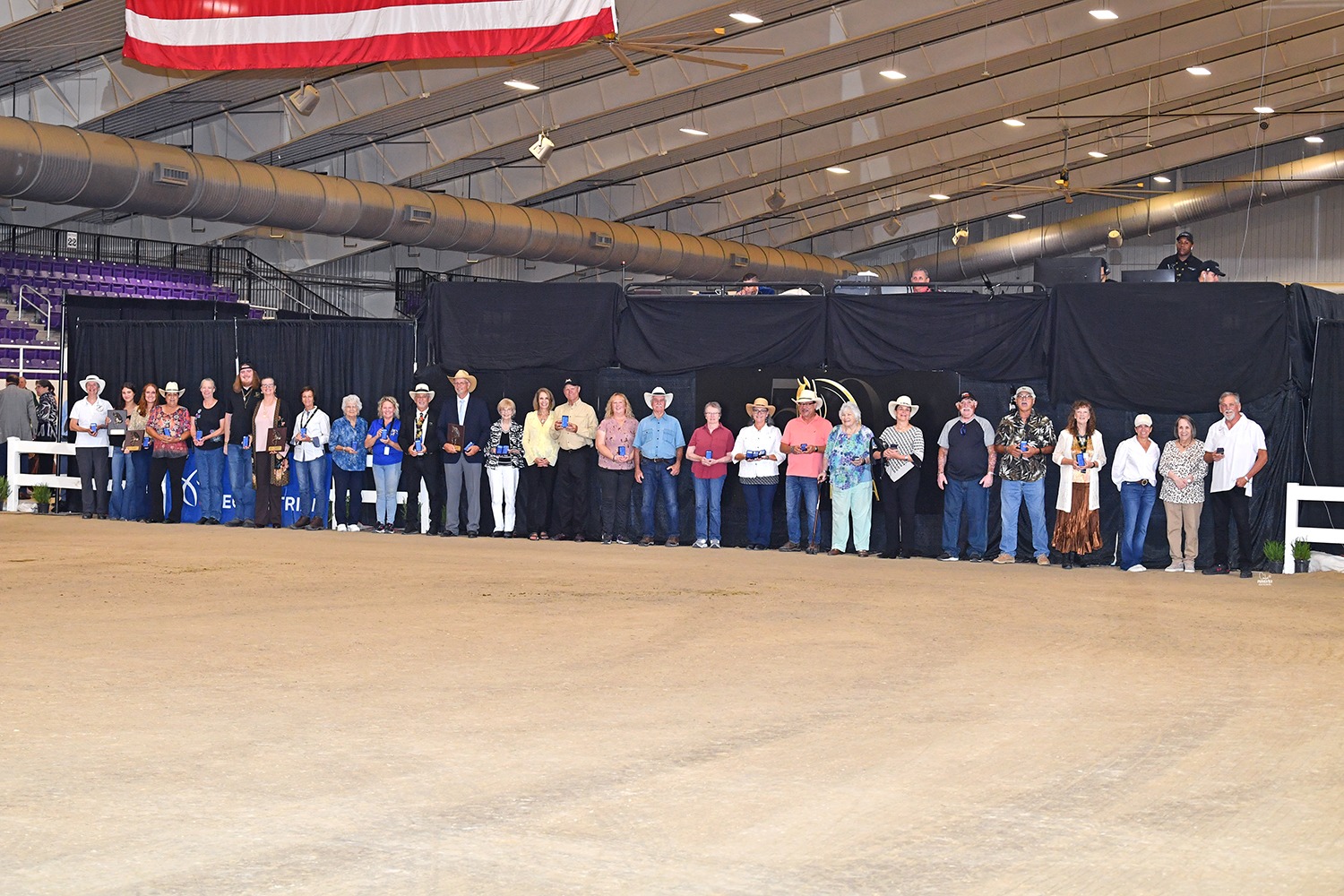
Decade of Distinction Honorees
Member #131 Carlos R Blanco
Member #137 Patti Blichmann
Member #212 Alexandra Amador
Member #284 Osvaldo de La Vega
Member #346 Rufino Figueroa
Member #347 Daniel Chaguin Figueroa
Member #376 Edith “Edie” Gandy
Presented in Memoriam of Member #389 Phyllis Gaudreau
Member #401 Dr. Rosanne Gmuer
Member #478 Michael Hoo
Member #506 Alvaro Iriarte
Member #507 Magda Iriarte Reid
Member #542 Carolyn Barren
Member #545 Jennifer Karnes
Member #676 Rick Meyer
Member #690 Bonnie Minter
Member #691 Charles Minter, Jr.
Presented in Memoriam of Member #692 Charles Minter, Sr.
Member #684 Bill Minter
Member #695 Nicanor Miranda
Member #720 Fred Moretti
Member #790 Ellen Perez
Member #808 Barbara Preiss
Member #832 Robin Ratliff
Member #887 Ernesto Sanz
Member #910 Laura Scouten
Presented in Memoriam of Member #976 Margaret Stewart
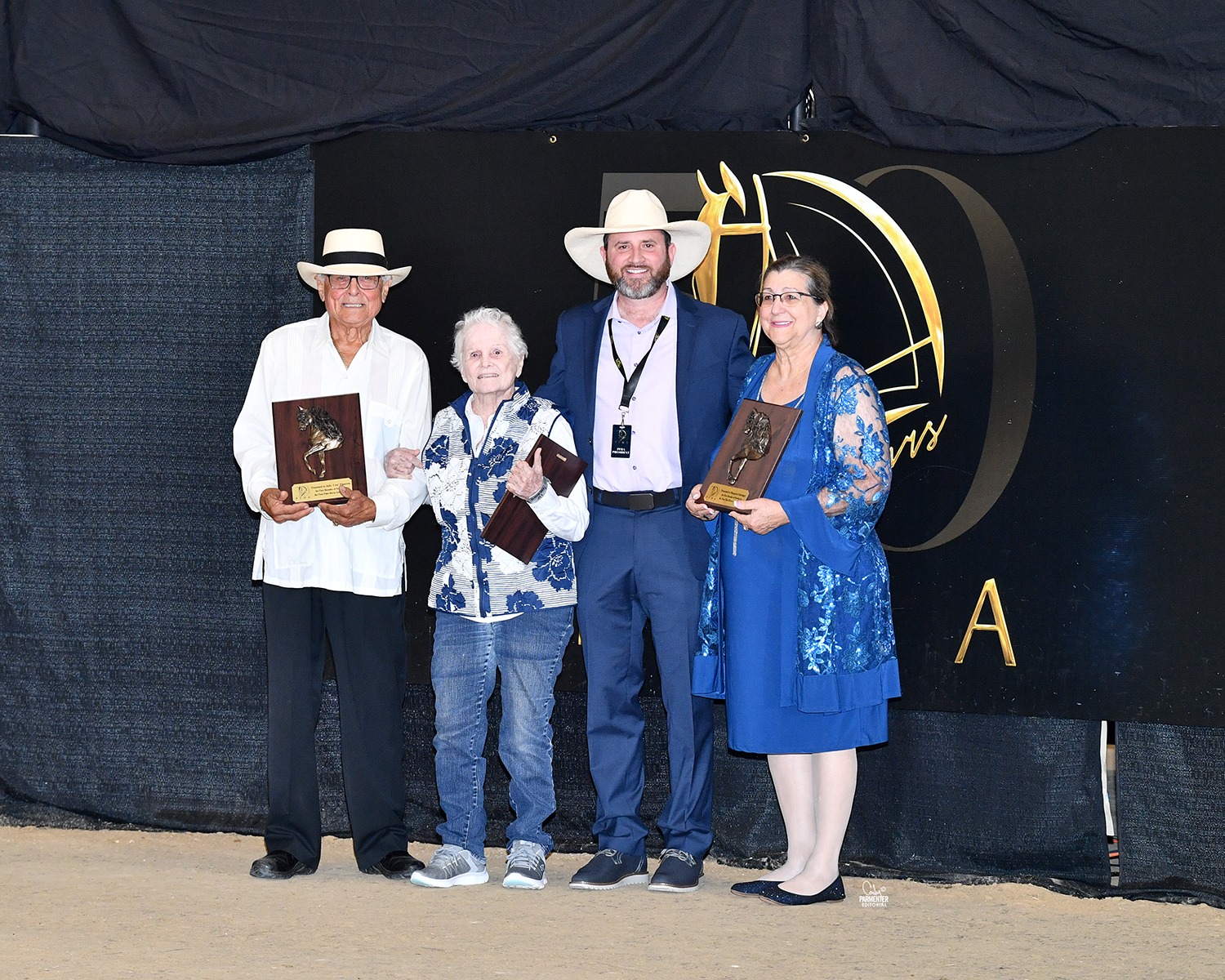
Member #978 Pamela Frady
Member #1006 Cindy Griffeth
Member #1018 Pat Figueroa
Member #1023 Elizabeth “Beth” Uelsmann
Presented in Memoriam of Member #1024 Larry Ulesmann
Presented in Memoriam of Member # 1025 & 1026 Mary & Tom Ulesmann
Member #1076 Lynn Gallop
Presented in Memoriam of Member #1090 Robert “Bobby” Yunits
Presented in Memoriam of Member #1182 Clemencia Iriarte Tobar
Member # 1392 Angelo Usategui
Member #1491 Rose Ann “Annie” Harper-Howell
And from Canada – Denise (Bos) Langford
We the members of PFHA – Thank you for the decades you have supported, loved and dedicated to this amazing breed of horse. We are PFHA because of YOU!
Remarks from PFHA’s current President, Jose M. Colon
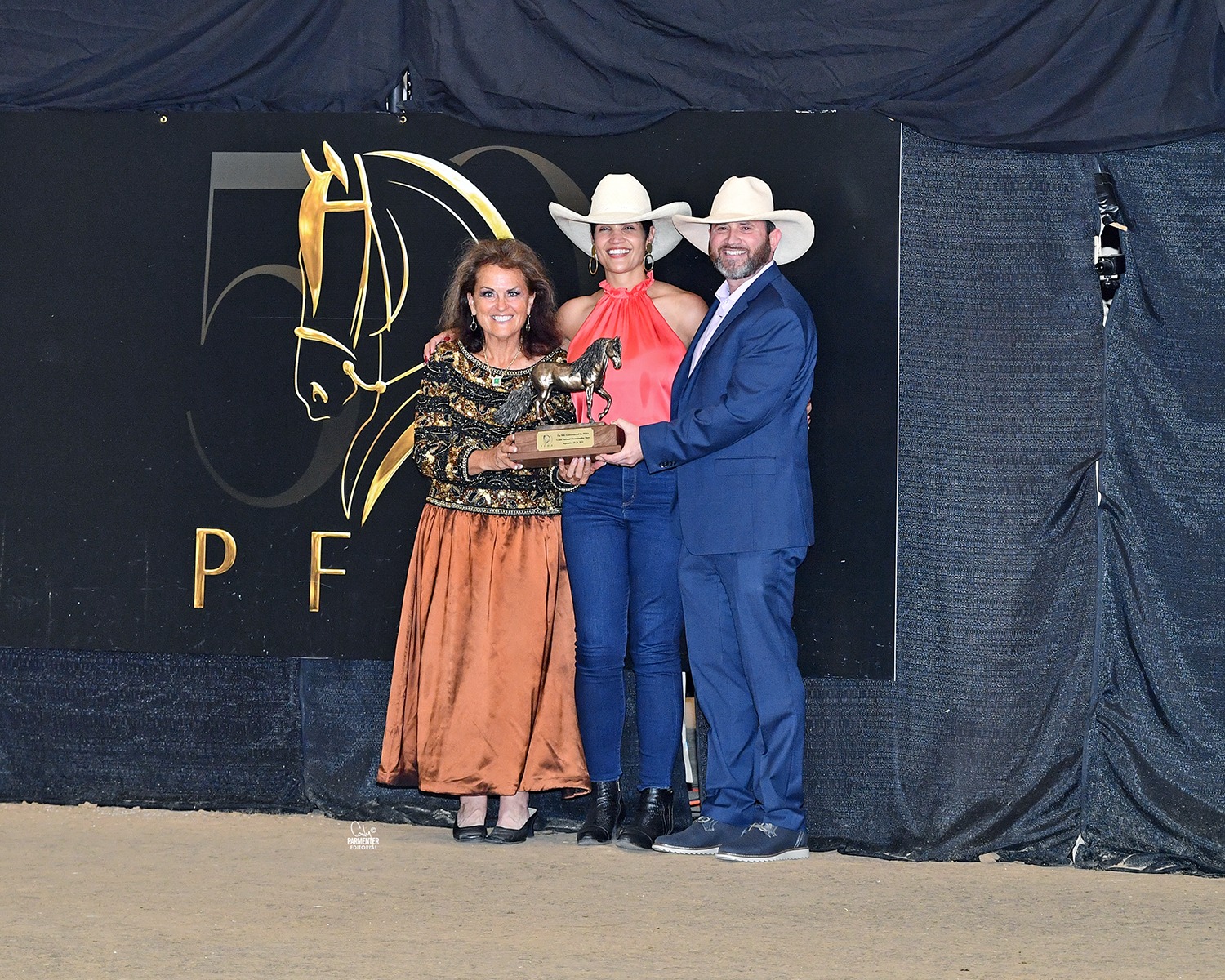
We are grateful to Gladymar Vrkic for our new trophy
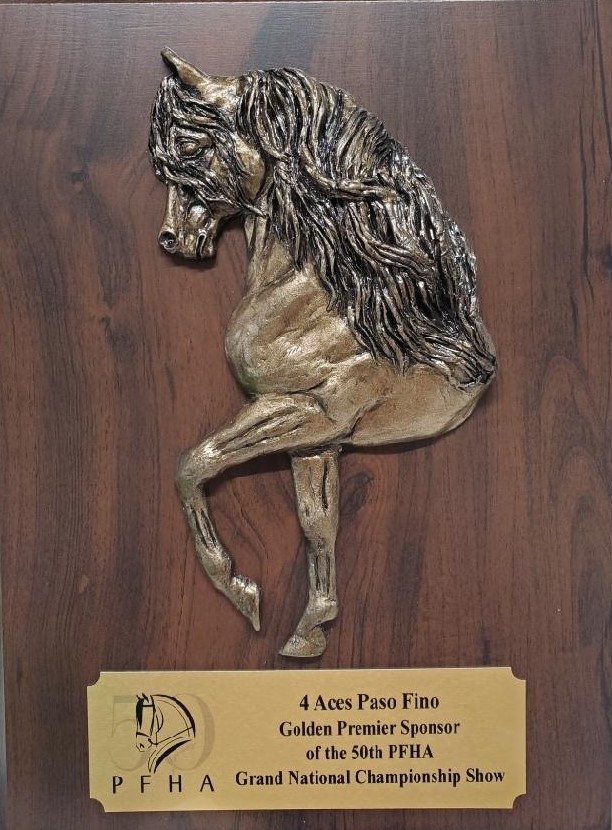
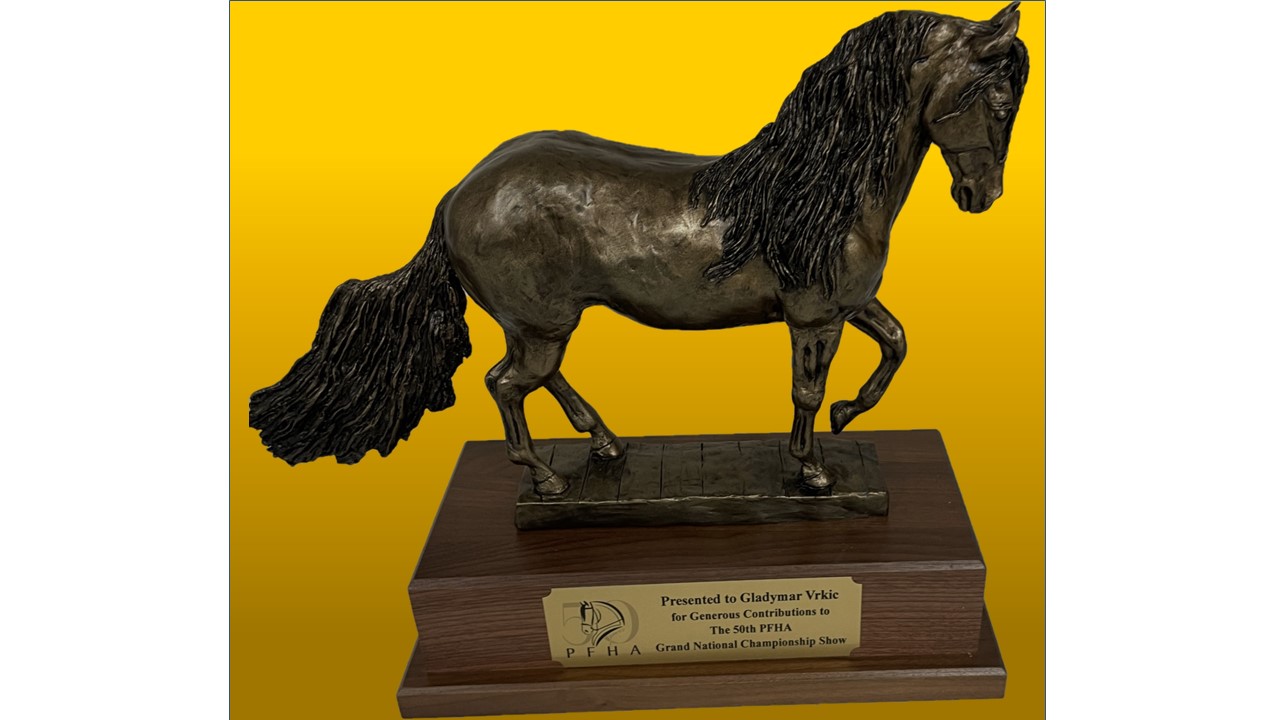
“As we reflect on our history with the respect it deserves, we move forward with a creation to represent our future.
A new trophy has been designed by renowned sculptor Summer Frost that truly represents our amazing Paso Fino breed. This coveted award will be presented at our 2023 Grand National Show marking our step into the next 50 years igniting a fire for the next generation. This trophy made possible by the generous donation of PFHA member – Gladymar Vrkic. We are forever grateful to Gladymar who made possible this remarkable representation of the Paso Fino horse for our signature award.
Our future is now – Our future is bright – Our future is YOU the members of the PFHA! With you there is the promise of another 50 years! We dedicate the 2022 Grand National Show to YOU our members with much gratitude and honor!”
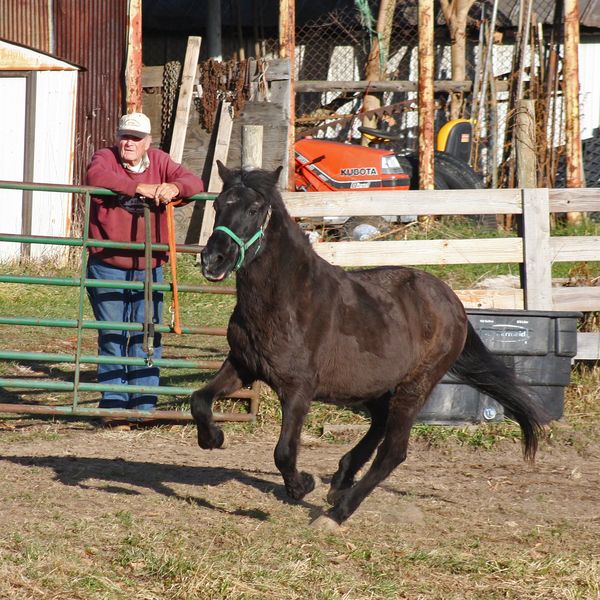
Harland Currie's love of horses started from childhood. When he was only 3 years old, his father brought a little white pony to their Wisconsin dairy farm, sparking an interest that would last a lifetime. In the 1980s, after many years of showing quarter horses, a serious back injury led to Harland's discovery of the Paso Fino and their smooth gait - He was instantly hooked. Two years later, Pover-T-Farm was created named for an inside joke that clearly these horses were going to bankrupt him! Harland had quickly established a small herd of 4 broodmares and a handsome gelding for showing. For the next several years, Harland and his small herd bred, showed, and grew to more than 22 horses! If you visited Pover-T-Farm today in Union Kentucky, you might not be able to tell that it was once home to national champions and numerous flashy foals. The farm sits atop a beautiful Kentucky hill with huge maple trees and miles of wood board fencing. Hills once filled with many horses now hold but a few. One thing unchanged by this passage of time is the love Harland has for his 4-legged “children.” Instead of babies and show horses, the farm is now home to Harland’s beloved, aging trail horses and some grateful kill pen rescues. A tribute to the essence of the Paso Fino breed, at first glance you may not realize that among Harland's horses are two 28-year-olds and a very special 34-year-old gelding, Dorado de Plebeyo del San. When Harland often leans against the stall to gently pet Dorado’s fuzzy face, a spark lights in both their cataract-filled eyes as he regales any eager listener with tales of trail riding mishaps and parade shenanigans. It has been a few years since the duo saddled up together, but you can still see that bond that only comes once in a lifetime and a spark of brio in both of their hearts.
By Virginia Foster
Photographer Ron Colburn
PFHA Board of Directors has demonstrated their strong commitment to our recreational riding members by voting unanimously to implement the Trail Horse Test (THT) program. The program is designed to recognize the responsive, well-mannered trail horse. This is not a competitive obstacle challenge, rather the horse is judged against a standard of performance as it completes the tasks normally performed, before, during and after a trail ride. The standards are set at three levels of performance: Junior, Senior and Master Level. The test is divided into 7 categories: trailer loading; grooming & tacking; ground exercises; exercises under saddle; performance on the trail; trail obstacles; and the most important category-overall temperament. Each category is further divided into test elements that are scored on a scale of 1 to 5. The horse must receive a passing grade before advancing to the next level.
The program is opened to all breeds. For PFHA registered horses, the level the horse achieves is recorded in the horse’s PFHA registry record. Any PFHA member can host a Trial Horse Test. The test is managed much like the regional shows are. The requestor is responsible for organizing and managing the event. The requestor keeps whatever profit is earned from the event.
The PFHA Recreational Rider Committee, under Judi Bradbury’s chairmanship, is administering this program. It has been in development for several years. We thank the numerous trainers, judges, and amateurs that have contributed to the refinement of the program, especially Dick Teachout who came up with the original idea; Rick Shaffer who donated countless hours setting the frame work; Liz Sherman who edited and re-edited the documents I produced that describe the program; Nola Haupert-Keill who hosted and judged the first beta test in 2015; Judi Bradbury who hosted the second beta test and all the participants who allowed us to use them as guinea pigs. In 2017, the program took off to a great start thanks to the generosity and hospitality of Peggy Tanner, who hosted the first official test at her Paradise Farm in Bixby Oklahoma on March 26, 2017. (And believe me her farm is paradise.) Seven participants elected to be tested at the Junior level. One opted to be tested at the Junior and Senior level. We are happy to announce Rick Shaffer, the judge, passed the following seven horses at the Junior level: Rico ridden by Rebecca Hoover; Chico ridden by Michele Rader; Birdie ridden by Tonia Colburn; Diego ridden by Leigh Ann Hoover; Calesita ridden by Margaretta Mays; Prince ridden by Tom Mays; and Silver ridden by LeeAnn Dreadfulwater.
Each were awarded a certificate, a small medal bridle tag with the words “PFHA JR Trail Horse”, and a patch with the PFHA Logo. They were also provided with a copy of their scorecards, so they know where they excelled and what they need to work on.
These are comments from the participants and spectators of the first test.
“Give this program a try before you judge it.”
“I learned a lot. I have a step by step plan on what I need to work on.”
“I thought it was just going to be pros showing off, making me feel dumb. It was not that. It was all of us learning how to work with our horses. Rick was fantastic!!”
“I wish I had brought a horse.”
“I will be back in October for the next test.”
We encourage members to submit suggestions for improvement to the Rec Rider Committee Chair, Judi Bradbury at wbrad444@gmail.com. This is your program, Rec Riders! Let’s show the world what great trail horses we have.
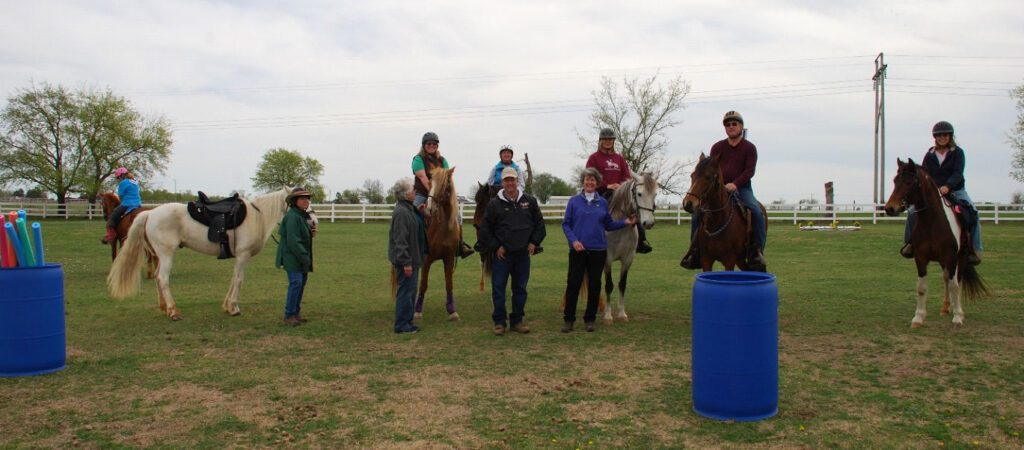
From left to right – LeighAnn Hoover, LeeAnn Dreadfulwater, Peggy Tanner, Rebecca Hoover. Tonia Colburn, Rick Shaffer, Virginia Foster, Margaretta Mays, Tom Mays, Michele Rader
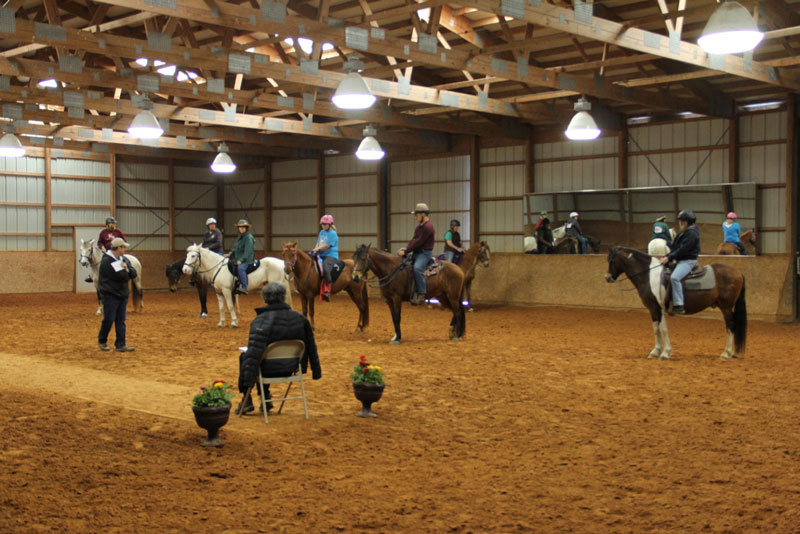
Rick Shaffer judged the exercises under saddle while Virginia Foster recorded Rick’s scores for each horse for each test element.
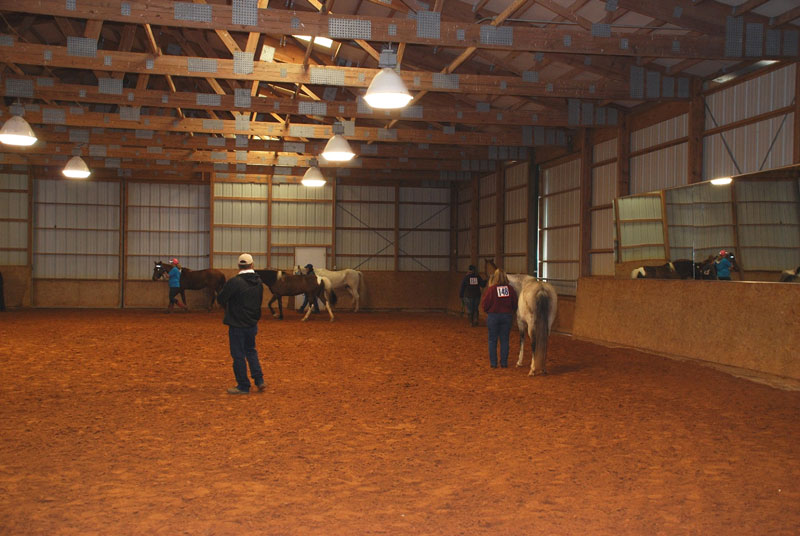
Rick Shaffer judged the ground work exercises.
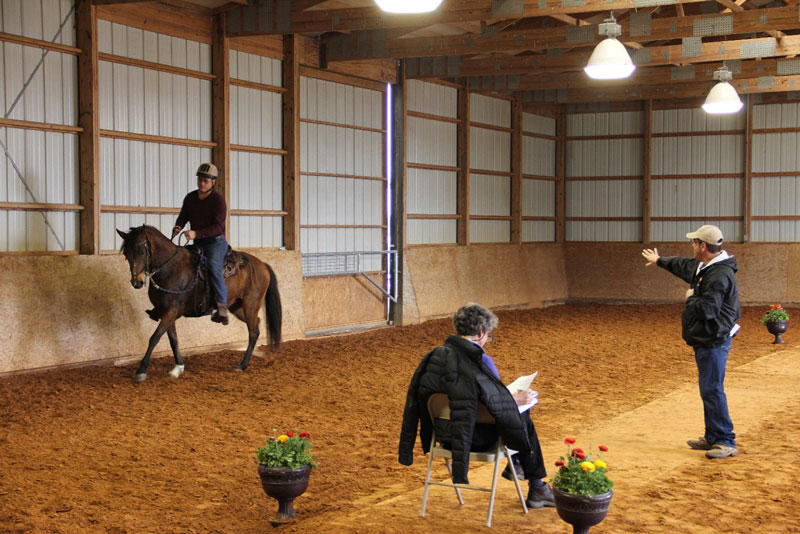
Rick Shaffer gave Tom Mays training tips on how to use the wall to train turn on the haunches.
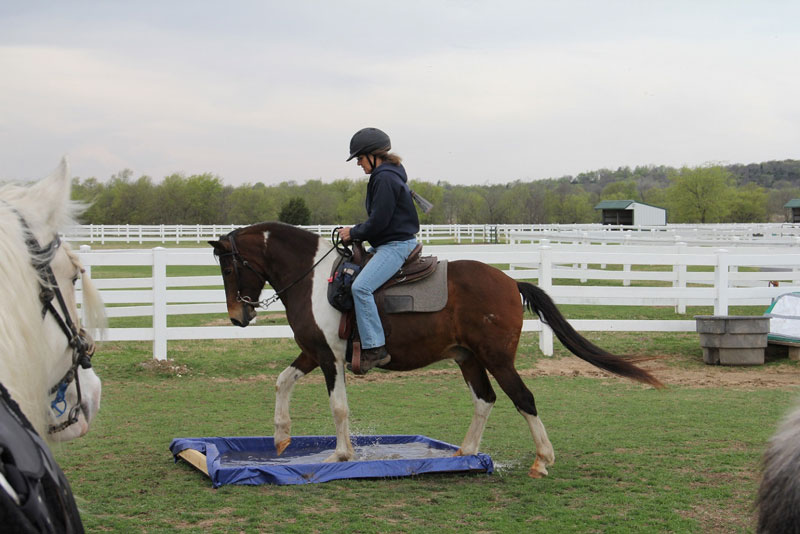
Chico ridden by Michele Rader scored a perfect score on the dreaded water obstacle.
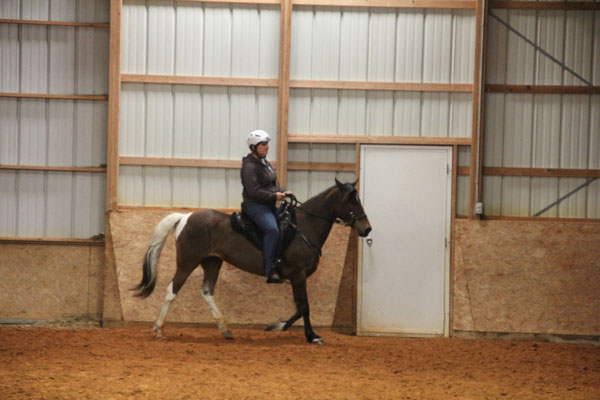
Birdie ridden by Tonia Colburn kept a consistent speed at the corto and scored high for it.
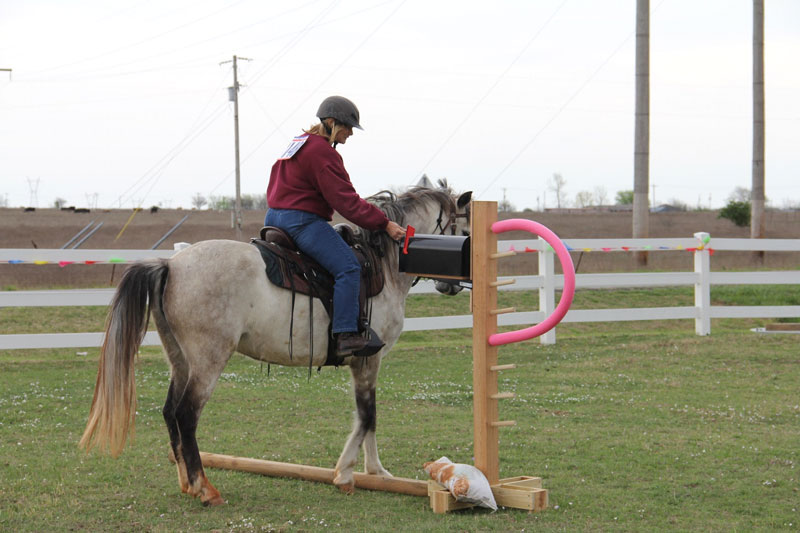
Calesita ridden by Margaretta Mays scored well at the mailbox.
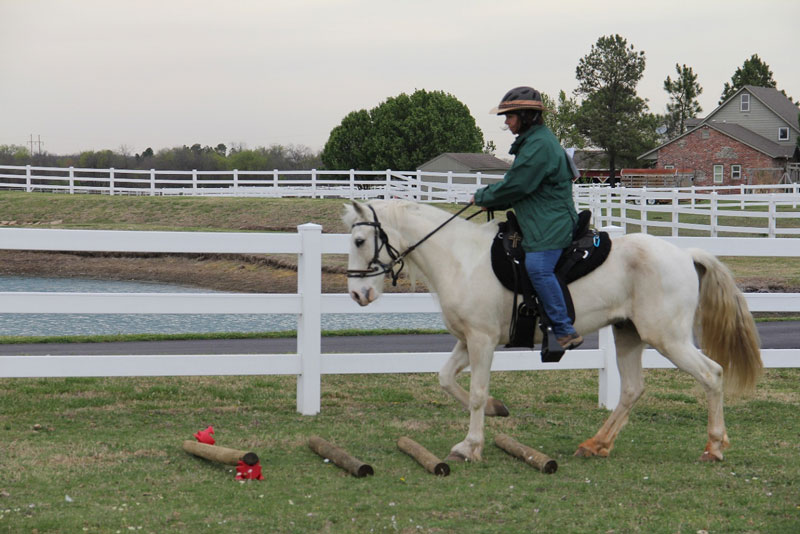
Silver ridden by LeeAnn Dreadfulwater stepped lightly through the poles and received a high score.
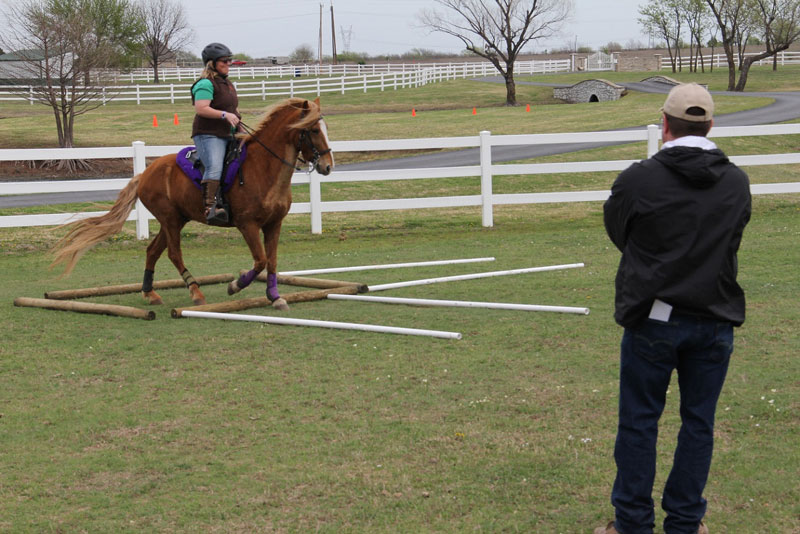
Rico ridden by Rebbecca Hoover scored high on this obstacle that tests Rico’s ability to obey commands to move all parts of his body.
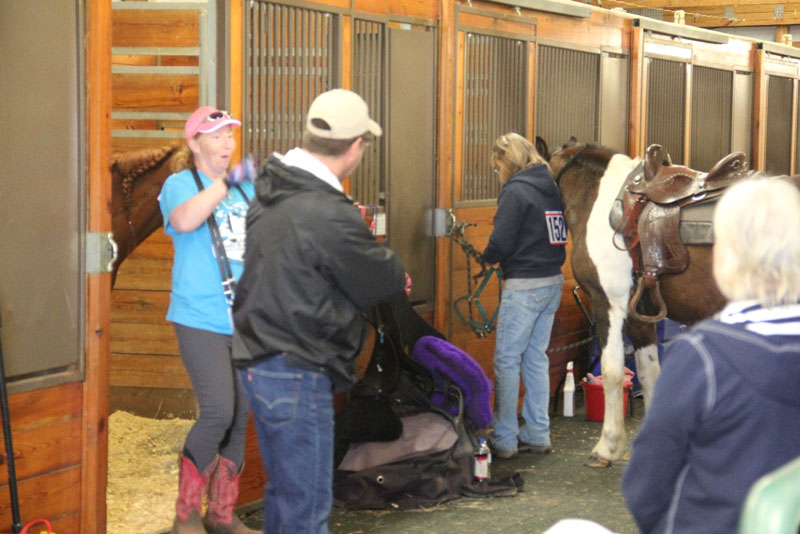
LeighAnn Hoover received all 5s (perfect) for grooming and tacking. Diego never moved a muscle.
by John Tonetti
A review of fundamental good practices will keep us mindful of the best way to avoid problem areas and the perception of unethical behavior in the buying and selling of horses.
Formalize Mutual Expectations
Educating ourselves and future members as to the importance of clarifying and formalizing mutual expectations is a critical element of a successful transaction. The perception of unethical behavior is most often linked to a failure by omission or commission to formally disclose details regarding the circumstances surrounding the buying and selling of a horse.
The following list of countermeasures will enhance the likelihood of a successful transaction and avoid the perception of unethical conduct by buyer or seller.
FULL DISCLOSURE is always necessary. The full disclosure of every detail pertaining to a horse's medical history, detracting habits and propensities should be formalized to a potential buyer. Such disclosure should specifically address issues such as lameness, founder/laminitis, prior colic, surgeries, injuries, cribbing, kicking, biting, stall weaving, breeding soundness (whether a stallion's semen is fertile and suitable to be frozen or a mare is cycling and producing a follicle).
A PRE-PURCHASE EXAMINATION benefits both the seller and the buyer. The seller should encourage the buyer to obtain a pre-purchase examination by a vet of the buyer's choosing. Such an examination should include but not necessarily be limited to the topics listed above and might include a blood test for the presence of any medications. Where time constraints do not allow for completion of a vet check prior to the purchase, provisions in the written purchase agreement should stipulate that the transaction is contingent upon satisfactory completion of a vet examination within a stipulated time period.
Discuss and match a PROSPECTIVE RIDER'S HORSEMANSHIP SKILLS relative to the horse being considered for purchase.
Specify in the Sales Agreement the seller's assessment of horse's level of training: "this horse recommended for experienced riders only" or "this horse is green broke with three months training." This is especially important for the novice or "first time” horse buyer.
Discuss the REGISTRATION STATUS of the horse. This is an essential step in the purchasing process. Address the process to record the transfer of ownership in the records of the Association. Your sales agreement should state who is responsible to mail the registration certificate to the Association, who will pay for the transfer etc. Discuss and formalize any potential issues regarding registration status, ownership, or the transfer process, i.e., signatures of past owner (s), of dam and sire at the time of breeding and foaling (if not yet registered), a Stallion Breeding Report, listing the dam of your horse on file with the Association (if not yet registered).
A WRITTEN PURCHASE AGREEMENT should be prepared in all cases ranging from the simplest to the most complex including ones where the transaction involves an agent or broker. Any commissions accruing because of a sale/purchase transaction should be formally disclosed and made explicit as to who is paying how much and to whom.
In Summary
The logical human reaction to not knowing what to realistically expect in each situation is to avoid such situations in the future. A bad experience in the eyes of the buyer or the seller can be avoided by disclosing and formalizing the details. If this is not done, it is reasonable to expect that either buyer or seller or both may simply be inclined to avoid future bad experiences by choosing to do something else with their time and money. Taking the time to understand and be understood regarding mutual expectations and formalizing details in a written agreement is in the long-term best interest of every person buying or selling a horse. The seller is most often the more experienced and knowledgeable party to a transaction and is most often the one who is blamed if things don't work out. The obligation is on the seller to take the lead in modeling ethical conduct in a sales transaction. In fact, instead of Buyer Beware, the mantra should be Seller Beware, as a reputation is a horrible thing to lose!